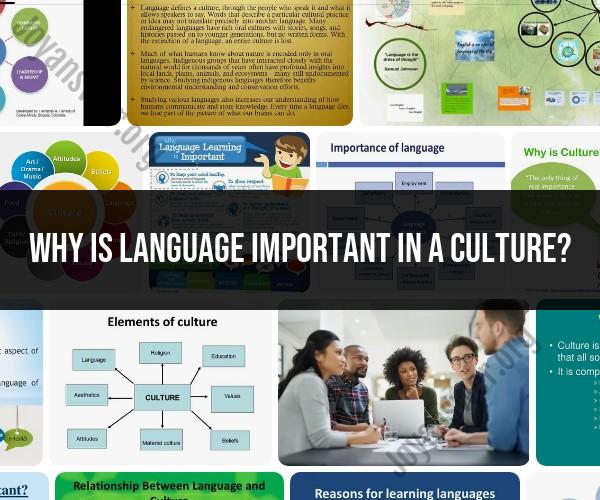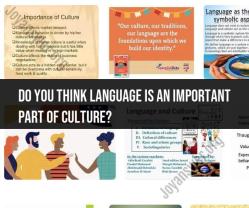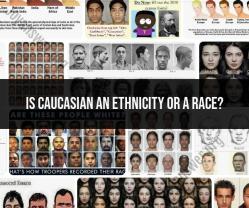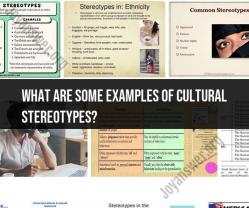Why is language important in a culture?
Language plays a fundamental and multifaceted role in shaping and preserving culture. Its significance in culture can be understood through various lenses, and here's a deep dive into why language is crucial in the context of culture:
Communication: Language is the primary means of communication within a cultural group. It allows people to convey their thoughts, emotions, ideas, and experiences to others. Effective communication is essential for the transmission of cultural norms, values, and traditions. It enables the sharing of knowledge, stories, and wisdom, fostering a sense of belonging and unity among members of the culture.
Identity and Belonging: Language is often a marker of cultural identity. It can define a person's sense of belonging to a particular group or community. People who share a common language often feel a strong connection to their cultural roots. Language can serve as a badge of identity, helping individuals relate to their heritage and cultural background.
Preservation of Tradition: Language is instrumental in preserving a culture's traditions and historical knowledge. Many cultural practices, rituals, and stories are passed down through generations via oral or written language. Without a means of communication, these valuable cultural elements would be lost, making language a critical tool for maintaining cultural continuity.
Shared Values and Norms: Language is a vehicle for conveying a culture's values and norms. Through language, societies can articulate their ethical, moral, and behavioral standards. Proverbs, idioms, and stories often carry the wisdom and guidance of a culture, shaping the way people perceive and navigate the world.
Cultural Expression: Language is a medium for artistic and cultural expression. Literature, poetry, music, and theater are all deeply rooted in language. Different languages can offer unique nuances and artistic forms that contribute to a culture's richness and diversity. Cultural expression through language fosters creativity and innovation.
Social Cohesion: A shared language facilitates social cohesion. It enables people to form relationships, cooperate, and collaborate within a community. Language creates a sense of trust and solidarity among speakers, which is crucial for a culture's social fabric.
Worldview and Perception: Language influences how people perceive and interpret the world. Different languages have varying ways of expressing ideas and experiences, which can shape a culture's worldview. For example, some languages have specific words for concepts that may not exist in other languages, reflecting different cultural priorities and perspectives.
Adaptation and Change: Language is not static but evolves over time. As cultures adapt to changing circumstances, so does their language. This dynamic relationship between language and culture allows societies to incorporate new ideas, technologies, and influences while preserving their core values.
Diversity and Multilingualism: Many cultures are multilingual, with multiple languages coexisting within a single society. This linguistic diversity can enrich a culture by bringing in a variety of perspectives and influences. Multilingualism can also foster tolerance and understanding between different cultural groups.
In summary, language is an indispensable cornerstone of culture. It enables communication, preserves tradition, defines identity, and shapes the way people view the world. The significance of language in culture is profound, as it not only reflects a culture's past and present but also plays a pivotal role in determining its future.
The Significance of Language in Culture: A Deep Dive
Language is a fundamental part of culture. It is the way we communicate our thoughts, feelings, and values. It is also the way we share our stories, traditions, and beliefs. Language shapes our worldview and helps us to understand ourselves and our place in the world.
Language is significant in culture because it:
- Reflects and shapes cultural values and beliefs. Language is not just a tool for communication; it also embodies the values and beliefs of a culture. For example, the Japanese language has a number of words and expressions that emphasize politeness and respect, which are important values in Japanese culture.
- Preserves and transmits culture. Language is the primary way that culture is passed down from generation to generation. Through language, we learn about our cultural heritage, traditions, and beliefs. For example, many cultures have traditional stories and songs that are passed down through oral tradition.
- Facilitates social interaction and community building. Language is essential for building relationships and maintaining a sense of community. It allows us to communicate with each other, share our experiences, and work together. For example, many cultures have traditional ceremonies and rituals that involve the use of language.
Language as the Backbone of Cultural Identity and Communication
Language is a key component of cultural identity. It is one of the things that makes us unique as individuals and as members of a particular culture. Our language shapes the way we think, perceive the world, and express ourselves.
Language is also essential for communication. It allows us to share our thoughts, feelings, and experiences with others. Without language, we would not be able to build relationships, collaborate, or solve problems.
In many cultures, language is seen as a symbol of identity and unity. For example, in some cultures, people who speak the same language are considered to be members of the same community, even if they come from different backgrounds.
Language's Role in Preserving and Evolving Culture
Language plays a vital role in preserving and evolving culture. It is the primary way that culture is passed down from generation to generation. Through language, we learn about our cultural heritage, traditions, and beliefs.
Language is also dynamic and constantly evolving. As cultures change, so too does their language. New words and expressions are created to reflect new experiences and ideas. For example, the English language has incorporated many words from other languages, such as Spanish, French, and Chinese, as a result of cultural exchange.
Multilingualism and Cultural Diversity in a Globalized World
In today's globalized world, multilingualism is becoming increasingly important. People are more likely than ever before to travel, work, and live in different countries. This means that it is important to be able to communicate with people from different cultures.
Multilingualism also promotes cultural diversity. It allows us to learn about different cultures and perspectives. It also helps us to build bridges between different cultures and to promote understanding and tolerance.
Language Revitalization Efforts and Their Impact on Cultural Preservation
Language revitalization efforts are underway in many communities around the world. These efforts are aimed at reviving and promoting the use of endangered languages.
Language revitalization efforts are important for cultural preservation because language is a key component of culture. When a language dies, so too does a part of that culture.
Language revitalization efforts can have a positive impact on cultural preservation in a number of ways. For example, they can:
- Help to revive traditional cultural practices. Many traditional cultural practices are inextricably linked to language. For example, some cultures have traditional songs, ceremonies, and rituals that can only be performed in their traditional language.
- Promote cultural pride and identity. Language is a powerful symbol of cultural identity. When people are able to speak and use their traditional language, it can help to boost their cultural pride and identity.
- Transmit cultural knowledge to future generations. Language is the primary way that cultural knowledge is passed down from generation to generation. By promoting the use of endangered languages, language revitalization efforts can help to ensure that cultural knowledge is not lost.
Overall, language is a fundamental part of culture. It is essential for communication, cultural identity, and cultural preservation. In today's globalized world, multilingualism is becoming increasingly important. Language revitalization efforts are also important for preserving endangered languages and promoting cultural diversity.










